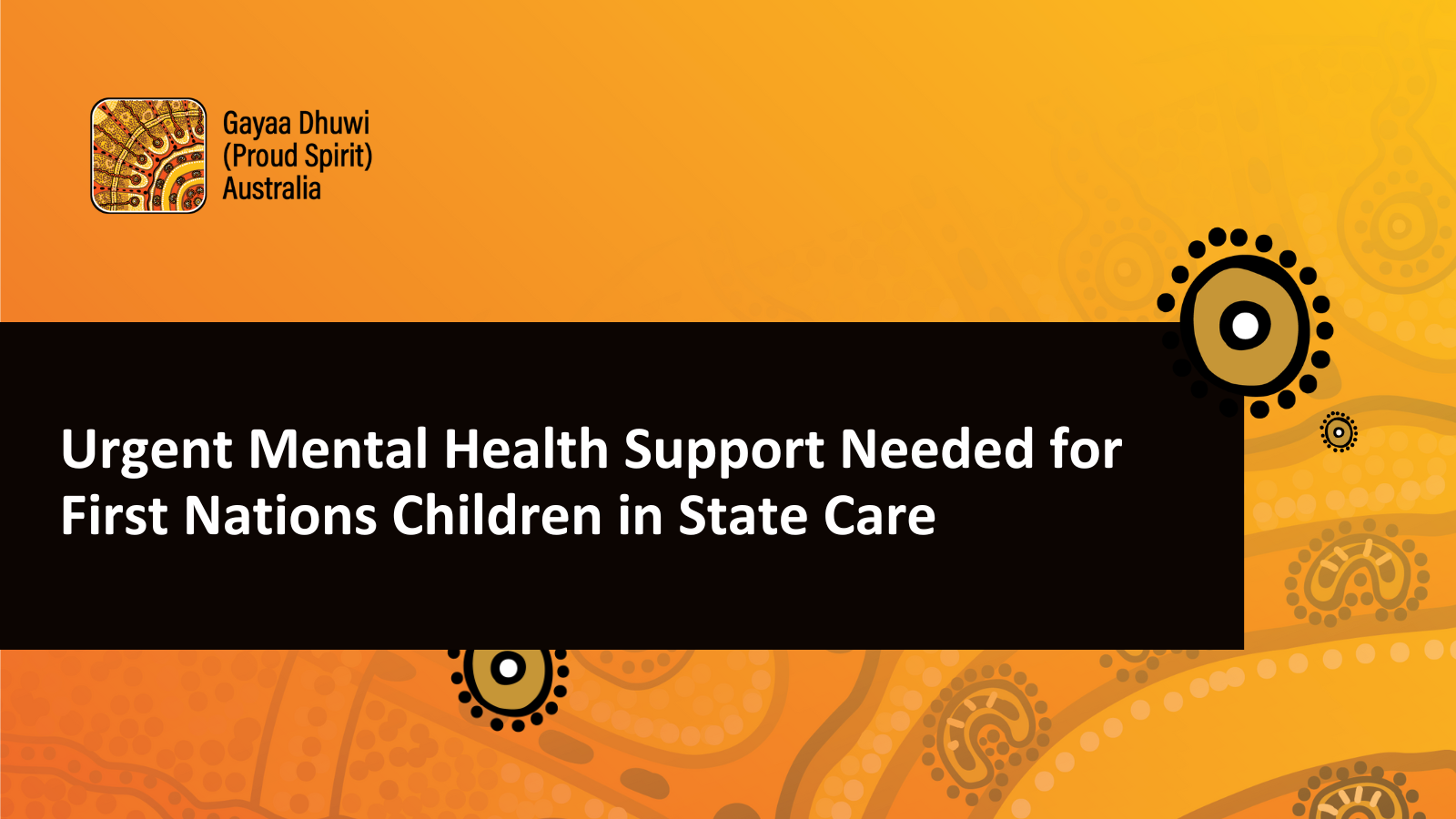Urgent Mental Health Support Needed for First Nations Children in State Care
DOWNLOAD THE JOINT STATEMENT, INCLUDING DATA TABLES
In response to the tragic death of a 10-year-old Indigenous boy by suicide while in state care last week, leading Indigenous mental health organisations are today calling on Federal and State Governments to urgently invest in social and emotional wellbeing (SEWB) and mental health supports for Indigenous children in state care.
“The death of any child by suicide is a tragedy. The death of a child by suicide while in state care, is a national disgrace and an inditement on Australia’s child protection system,” says Tania Brown, Interim Chief Executive Officer of Thirrili.
“Our hearts go out to the child’s family and community. As Indigenous people, our hearts are broken and continue to break every time we lose one of our young ones to suicide, especially when they are in the care of a system that’s supposed to protect them,” says Professor Helen Milroy AM, Chair of Gayaa Dhuwi (Proud Spirit) Australia.
Suicide is the leading cause of death for Indigenous children and young people. Indigenous people in Australia have the highest suicide rate out of any population globally.
Evidence shows that children removed from families are at a higher risk of suicide, and have an increased likelihood of contact with the criminal legal system.
In the 16 years since Rudd’s Apology, removals of Indigenous children have tripled. First Nations children now represent more than 40% of the total population of all children who have been removed from their parents – a staggering 23,000 children – but represent only 6% of the total population of children in Australia.
“We don’t need another inquiry or Royal Commission; what we need is action. We need to break the cycle of injustice, and that starts with providing Indigenous children with the wellbeing support they need to live well in their communities,” says Donna Murray, Chief Executive Officer, Indigenous Allied Health Australia.
While Government spending on child protection has increased over the last five years, the proportion of expenditure spent on family support and wellbeing has decreased and the proportion of spending given to Aboriginal Community Controlled Health Organisations (ACCHOs) to deliver this support continues to sit between 0.6%-21%, depending on the state or territory.
“To prevent similar tragedies in the future, we need to be investing more into support services to help children and their families stay well and connected within their communities. These services should be led and operated by First Nations communities, not external contractors,” says Dr Clinton Shultz, Director of First Nations Partnership and Strategy at the Black Dog Institute.
As leading Indigenous SEWB, mental health, and workforce organisations, we call on Federal and State Governments to implement the recommendations from the more than 40 Government reports into Indigenous child protection since the ‘Bringing Them Home’ report in 1997, including:
1. Increased investment and access to culturally-responsive, community-led support services;
2. Increased cultural responsiveness training for child protection and mental health workers;
3. Increased investment to build a more sustainable Indigenous SEWB and mental health workforce.
Media contact: Paige Pollard, Communications Manager | 0455 100 277 or media@blackdog.org.au
About the partner organisations
Australian Indigenous Psychologists Association (AIPA) is the representative body for Aboriginal and Torres Strait Islander psychologists in Australia. We aim to improve the social and emotional well-being and mental health of Aboriginal and Torres Strait Islander peoples by leading change required to deliver equitable, accessible, responsive and culturally sensitive psychological care which respects and promotes their cultural integrity. We advocate for increasing the number of Indigenous psychologists in Australia, to reach population parity and provide leadership on issues related to the social and emotional wellbeing and mental health of Aboriginal and Torres Strait Islander peoples.
Black Dog Institute is a global leader in mental health research and the only Medical Research Institute (MRI) in Australia to investigate mental health across the lifespan. Areas of strength include suicide prevention, digital mental health, workplace mental health, new treatments, and prevention in young people. We join the dots, connecting research answers, expert knowledge and the voices of lived experience to deliver solutions that work across the healthcare system for patients and practitioners alike.
Gayaa Dhuwi (Proud Spirit) Australia is the national peak body for Aboriginal and Torres Strait Islander social and emotional wellbeing, mental health, and suicide prevention. As a community controlled organisation, it is governed and controlled by Aboriginal and Torres Strait Islander experts and peak bodies, working in these areas to promote collective excellence in mental health care.
Indigenous Allied Health Australia (IAHA) is a national, member-based Aboriginal and Torres Strait Islander allied health organisation. IAHA leads sector workforce development and support to improve the health and wellbeing of Aboriginal and Torres Strait Islander peoples. IAHA also supports the broader allied health workforce and its associate membership of individuals and organisations with expertise, interest and commitment to improving the health and wellbeing of Aboriginal and/or Torres Strait Islander peoples. Our membership is diverse and works across sectors including but not limited to health, mental health, disability, aged care, education, justice, community services, academia and policy.
Thirrili is a not-for-profit organisation which aims to contribute to the broader social wellbeing of Aboriginal and Torres Strait Islander people: reducing the high rates of suicide through the delivery of a critical response service to support individuals and families affected by a suicide or other traumatic incidents; providing social support, practical assistance and advocacy support to affected individuals and families; building the capacity of local communities and service providers to care for and respond to social disadvantage, including suicides and traumatic incidents in their community strengthening individual, family and community resilience and social wellbeing, and contribute to addressing the social disadvantage needs of Aboriginal and Torres Strait Islander people and communities


